What role does humour play in coping with the climate crisis?
Author Andrew Boyd tells us why humour is the ultimate shock absorber in impossible times
I Want a Better Catastrophe. That’s the title of Andrew Boyd’s new guide to coping with escalating climate change. And if you’re anything like us, it fills you with dread and sadness and fear…but does it also make you laugh? Maybe a little? Or maybe right out loud? And notice how your body changes. The light shifts. It suddenly feels a little more doable, a little more possible, to hold the full weight of this crisis we’ve created. To open the book. To start at the beginning. To do the work. The awful, terrifying work.
Gen Dread talked to Andrew about where, how, and why he derives humour from such a bleak situation, and what his approach can offer all of us who are trying our best to cope.
GD: I watched a presentation you did where you opened by asking the audience to share what's hardest for them about the climate crisis. But you also made a lot of jokes – and it felt almost like a stand-up set. How do we make space for really hard emotional truths and humour at the same time?
AB: It’s absolutely necessary, but not that easy to do. As you know as well as anyone, we're in for a rough ride. It's a very serious and tragic topic – a hard reckoning. People and ecosystems are dying. And one response is: how can you dare to find anything funny about that? But it's almost more important – it's essential – to approach the darkest of things, with humour. It's a deeply human way to cope. It’s a powerful tool to hold the many layers of truth in an impossible situation. So it's almost incumbent upon us to figure out how to use this mysterious sense that we've been gifted with as a tool to face the things that are impossible to hold. Someone who read my book wrote to me that “humour is the shock absorber of life”. It helps us take the blows.
How did you decide to tackle the climate crisis with this approach?
Some of it comes from me and my sensibility that I historically bring to serious subjects. I'm sort of known for mixing philosophical, edgy, political explorations with creative, satirical street theatre and activism around subjects like campaign finance reform. I mean, what's funny about that? But then you come up with the Billionaires For Bush, right? So some of this comes from my history of bringing humour to dry, difficult, otherwise remote, hard-to-grapple-with, deadening subjects. And some of it comes from the existential intuition that I think a lot of us have, that it's one way to wrest control and dignity back from a situation that is undermining all you hold dear. So it's an empowerment strategy and an existential survival strategy. I think that the situation demands it. One of my touchstone quotes is from Oscar Wilde, who says, “if you're going to tell people the truth, you better make them laugh or they'll want to kill you.”
And this applies not just to how you communicate with others, but how you communicate with yourself, you know? You need it just to bear it yourself. To cherrypick a few chapter titles from my book that bring out that sensibility:
“Don't Worry, We're Not Heading Off a Cliff – Just Down A Sharp, Slippery Slope.”
“We Have Met the Enemy and He Is Us. No, Them! But Also Us. But Mostly Them.”
“We're All in This Together. Not!”
“No Need to Choose Between Mitigation, Adaptation, and Suffering. Just Get Good At All Three (Especially Suffering)”
There's a lot of insight and darkness and truth-telling woven into all that. Multiple competing ideas are true at the same time, and woven into that is humour, which Adam McKay calls a truth detector. It’s a way to alert you to the deeper truth of the situation and to weave the dark and the light together without being syrupy or treacly or injecting your hopium and striking a false note. It’s a way to hold the dark and the light at once in a very human way.
For those who haven't read your book, what exactly is funny about the climate crisis?
The job of the climate activist is not really to save the world in the way we’ve often cast the activist role. Maybe it was 20 years ago. But rather, it’s to help it get less worse, more slowly. So that's funny. It’s a pretty darkly funny take on what our job is. And so in the book I paint the scene of how basically we're knocking on doors saying, “uh, ma'am, would you please sign this petition to only destroy half the planet? It’s very important.”
So that's a tough task to commit yourself to. And that's sort of the premise of the book: we've passed the point, unfortunately. We didn't have to, but we did. If we'd done the right things 20, 30 years ago, if the fossil fuel corporations and their political handmaidens hadn't blocked progress and obfuscated the science and done all the things that we all know they did, then we would have been able to make a less disastrous transition to a new energy system and a new way of living in harmony with the planet. But they didn't. And so we weren't able to. And so here we are, locked in, inevitably at this point, for some kind of catastrophe.
That's the reckoning that I'm stepping myself through. And then along with myself, the reader. So then where do you land? In a humorous but very real way, I frame it as, well, we need to do all we can to achieve a better catastrophe: the best catastrophe that’s still available to us because of the hole we've dug ourselves into. We’re already speeding down this highway. We’re not gonna be able to get off at the 1.5 degree of warming exit. So can we get off at the 1.6 or the 1.7? We’re on track for 2. We can't slow down and turn according to what we've committed to. We’re not going to turn off to the 2.7. And there's a lot of uncertainty as we start skidding, right? So, how do we commit our whole selves to turning off as soon as possible, and what degree of catastrophe are we going to exit at? That premise requires humour.
Have you had an experience where you really reached someone who felt previously unreachable?
Somebody said this on either the Goodreads or Amazon reviews: “I NEVER wanted to read another book about climate change”. Like, who wants to read another book about climate change? And then the person said, “but this is not just another book about climate change!” I think the laugh gets them in the door. It allows them to re-reckon with the situation, or reckon with it for the very first time. They see the title of the book, they see that it's funny, and they're like, “okay, if this person's bringing humour to make the medicine go down, to be the shock absorber here, then maybe I can re-approach the subject. I can dare to open the book now. And I’m not going to be so wrecked”.
So I think it opens up space for them to engage. And this helps people when they've hit a place where they’re like “we're fucked!” and then they're paralyzed there. I'm saying, “yes, we're fucked AND here's what to do amidst the fuckedness, here’s how to feel amidst the fuckedness. Here's how to be of use, here's how to be good to your neighbours, here's how to act in good faith, in solidarity, with courage, with full acknowledgement of our situation. Here's how to step into the full truth of the situation”.
What would you say to somebody who's feeling real despair, real anxiety, and just absolutely cannot find the humour in this situation?
That's okay. That's really okay. The destruction of ecosystems, forcing hundreds of millions of people into refugee status – these things are not funny in the way we normally use the word. It's not funny. It’s deadly serious – like literally, deadly serious. Melissa McCarthy, one of the great comics of our era, says, “we've never needed to laugh more”. It is deadly serious, we need to be in that mode – I'm in that mode most of the time – in spite of writing a book that has humour in it, I'd say the majority of the book is not making jokes. So be deadly serious, which is required, and be useful, be effective, and keep your mental health. People have a lot of different coping mechanisms. For some people it's action. It's crunching numbers, doing an act, or being in community. For others, it's laughing or laughing in combination with action or in combination with being in the community. These aren't mutually exclusive.
But don't not laugh because you feel guilty about laughing. If you're not laughing because you're feeling it's wrong or you're gonna be disrespecting somebody, understand that they probably need to laugh too. Don’t not laugh because you think there's a firewall between being serious and seeing the cosmic joke that we've perpetuated, that we've done to ourselves. Because it’s not a black-and-white. It's not an either/or. Laughter can help us act. Laughter can help us feel the seriousness and the tragedy of the situation, actually.
And of course, let's just be clear that we're not laughing at any person, or anyone’s particular suffering – the laughter here isn't even laughter necessarily, it’s the vocalization of the cosmic joke of our situation. The dark, twisted thing we're in. It’s a wry smile at the same time as you're fiercely engaged with something. But we’re not laughing at suffering. We're rather acknowledging the hard truth of our situation and that more suffering is coming for us all, and in order to survive it, in terms of mental health and in terms of seeing and holding all of it, we need to get good at gallows humour. We need to get good at dark humour.
We've talked about humour as an offering that you’re giving to the public. I’m curious about your own inward coping strategy. When you're alone in your house, is humour part of how you process what's going on?
It is definitely very much in my bones. It is very much one of my own coping mechanisms. It is, I think, a way of knowing. It's like an epistemology. I don't think I can properly feel the truth of a situation without that kind of deeply paradoxical, darkly comic, Talmudic sense of humour, if you will. Because we are in a grand predicament, full of contradictions and paradoxes. And we can hold multiple opposite truths at the same time, as we also need to do for the Palestine/Israel situation. We need to do that for climate, too. It's almost instinctive to me now.
How do you think that came about?
I was always a jokester in my early days, in high school, and in a really dumb, punny way. Just stupid wordplay and bad, bad puns – like really bad puns. But somehow that evolved as I became more mature and more adult and more philosophical and more political. And then more humbled by how difficult it is. I went from “Oh, we're going to change the world!” and then “no, actually, no, we're not”. We are, but not in the easy, complete way that one expects in one's flush of idealism as a college student. That’s very humbling. And so how do you hold on to your ideals, but also acknowledge the tough resistance you get from reality when you’re trying to see your ideals to fruition? Humour becomes a way to do that Gramscian thing of optimism with the will and pessimism with the intellect. To embrace that paradox. That’s a call to action that he had – a call to a philosophical and moral approach to both pursuing your ideals while recognizing the difficult terrain that you're operating on.
Humour is a way to hold both of those and keep on going.
If you liked reading this, feel free to click the ❤️ button on this post so more people can discover it on Substack 🙏🏼
Making Waves
Decolonizing Therapy illuminates that all therapy is—and always has been—inherently political. Dr. Mullan, known as the Rage Doctor™, has poured her wisdom, passion, and dedication into this book; the emotional companion and guide to decolonization, and an invitation for Eurocentrically trained clinicians to unlearn, be willing to relearn and re-remember our ancestral medicines as a primary pathway towards a healthier and less violent future. Order your copy today and visit @decolonizingtherapy to find out more about how they're reshaping therapy, healing trauma, and join the movement for a more compassionate and inclusive approach to mental health!
As always, you can share your thoughts and reach the Gen Dread community by commenting on this article or replying to this email. You can also follow along on Twitter and Instagram.
‘Till next time!


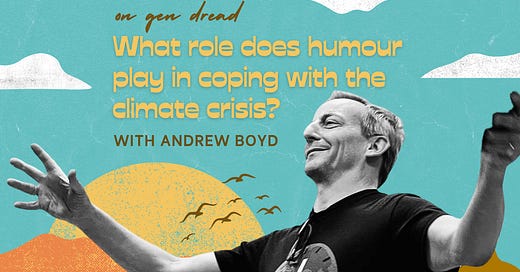



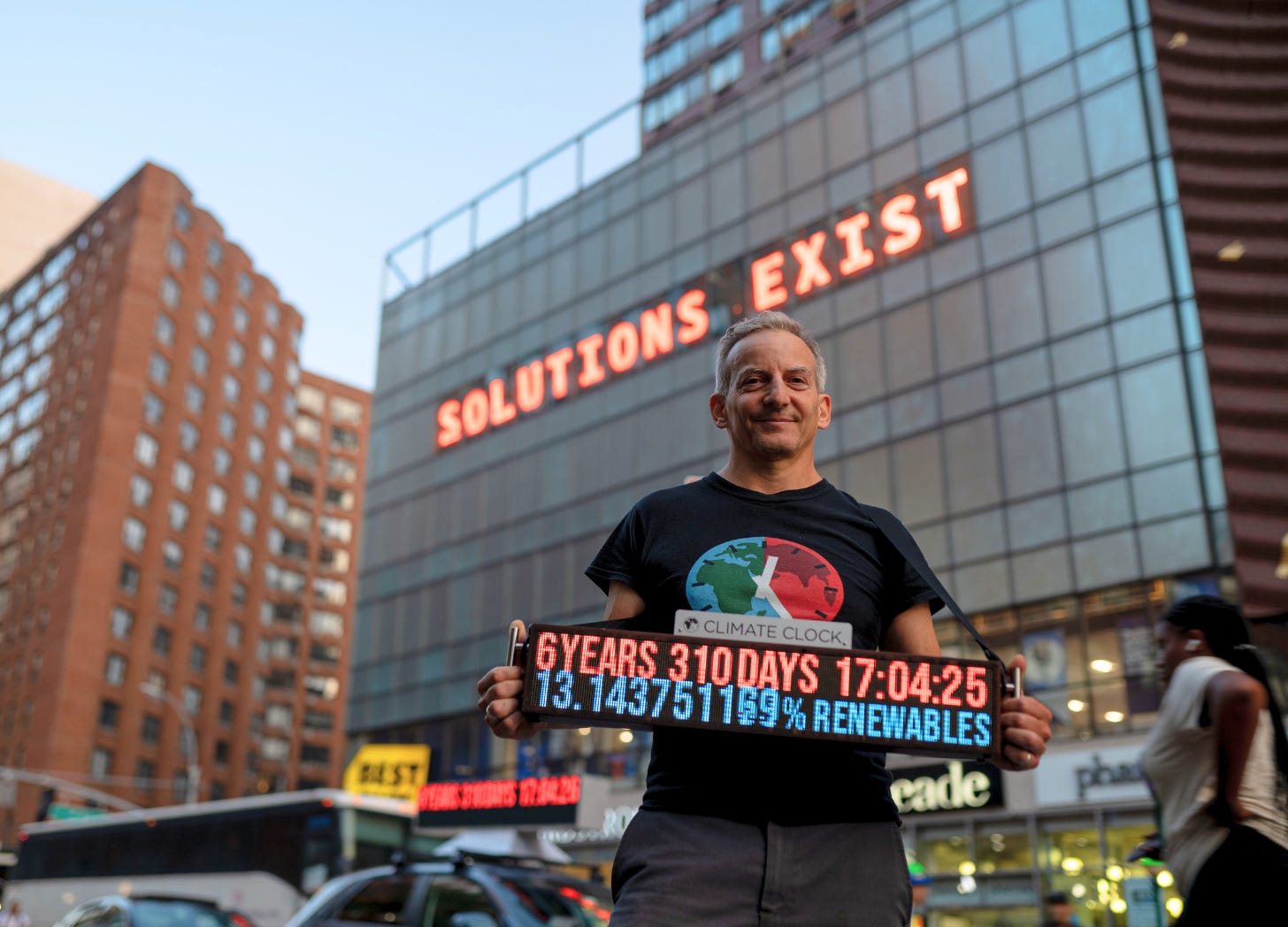
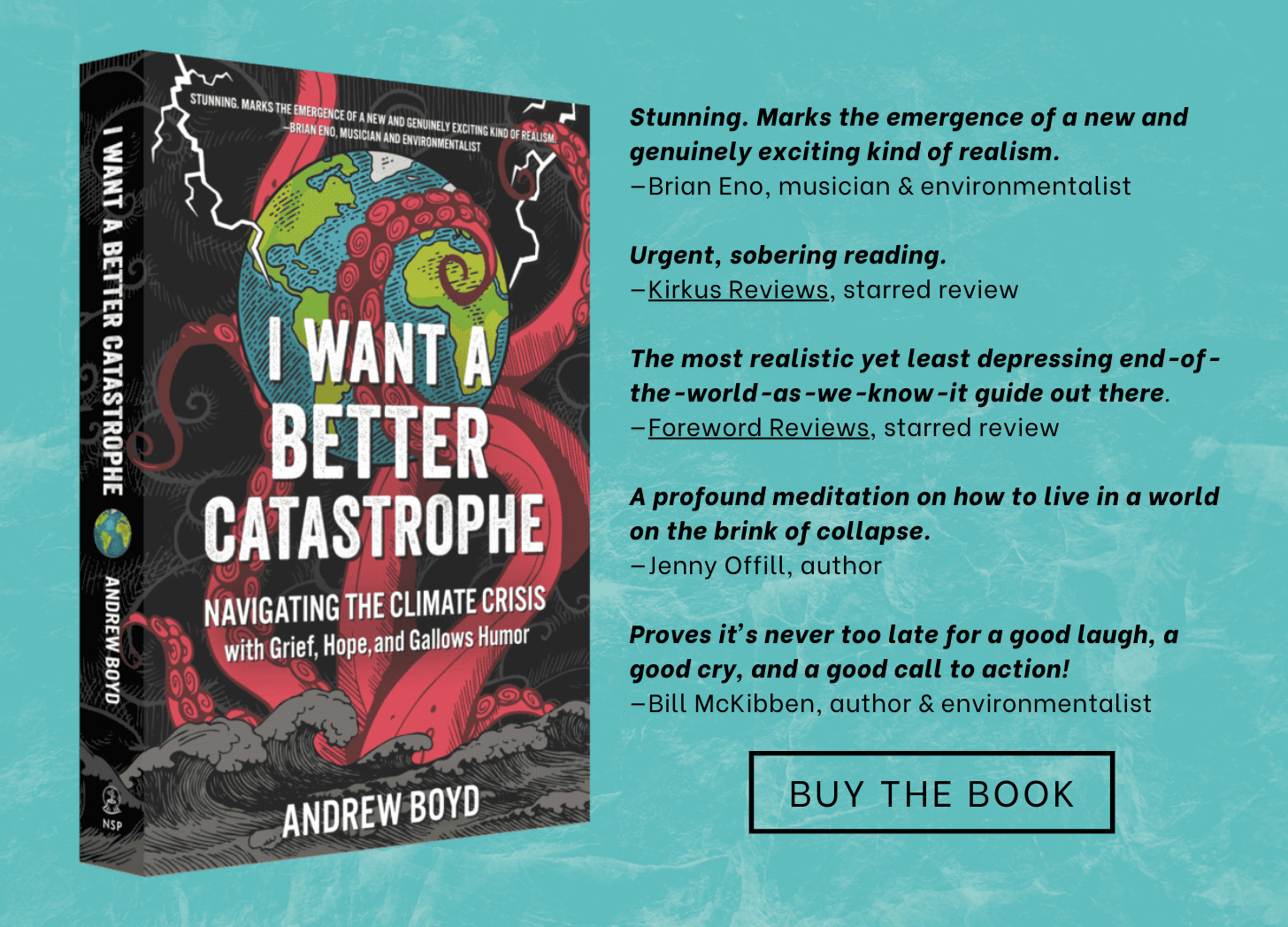
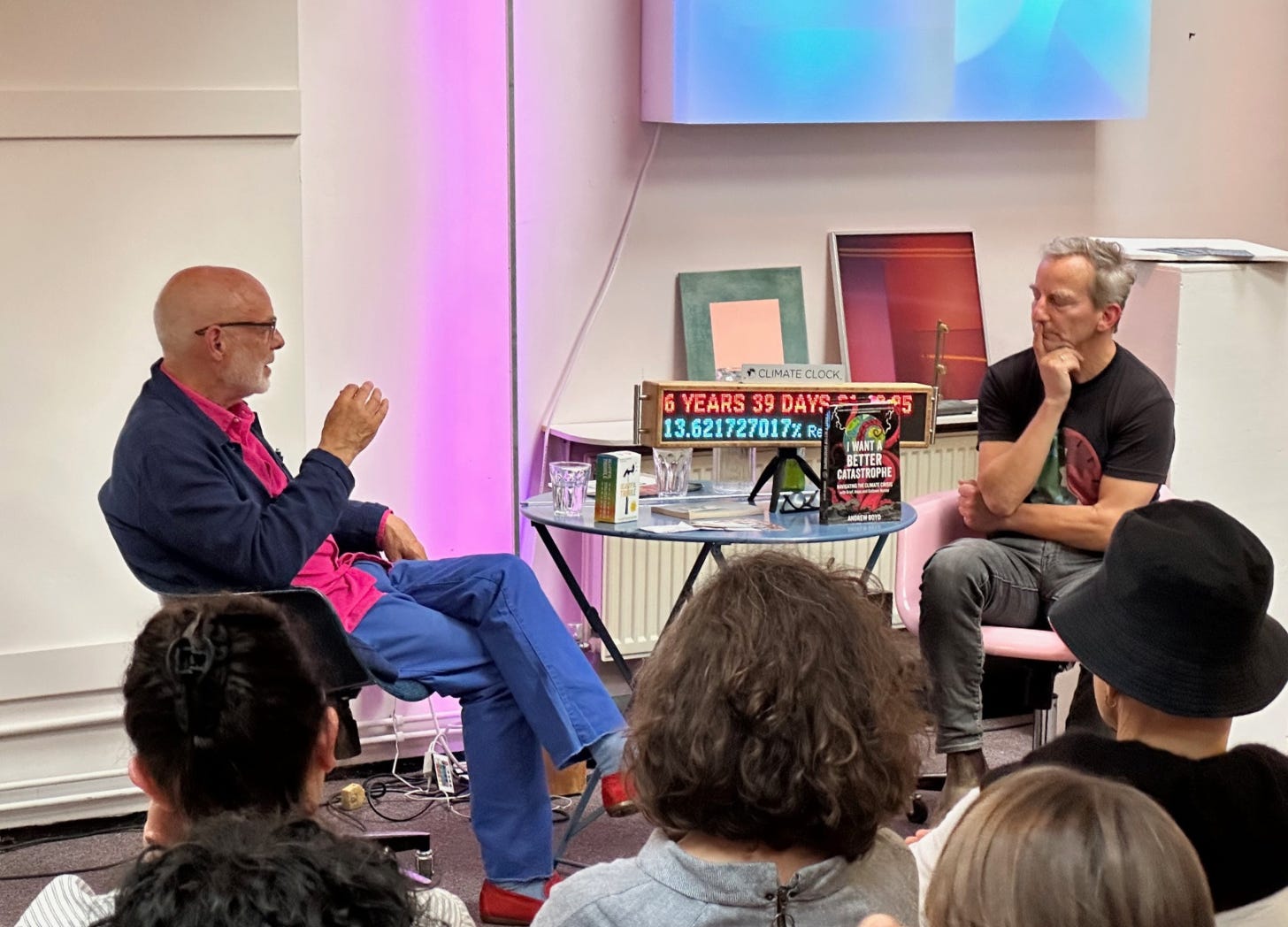
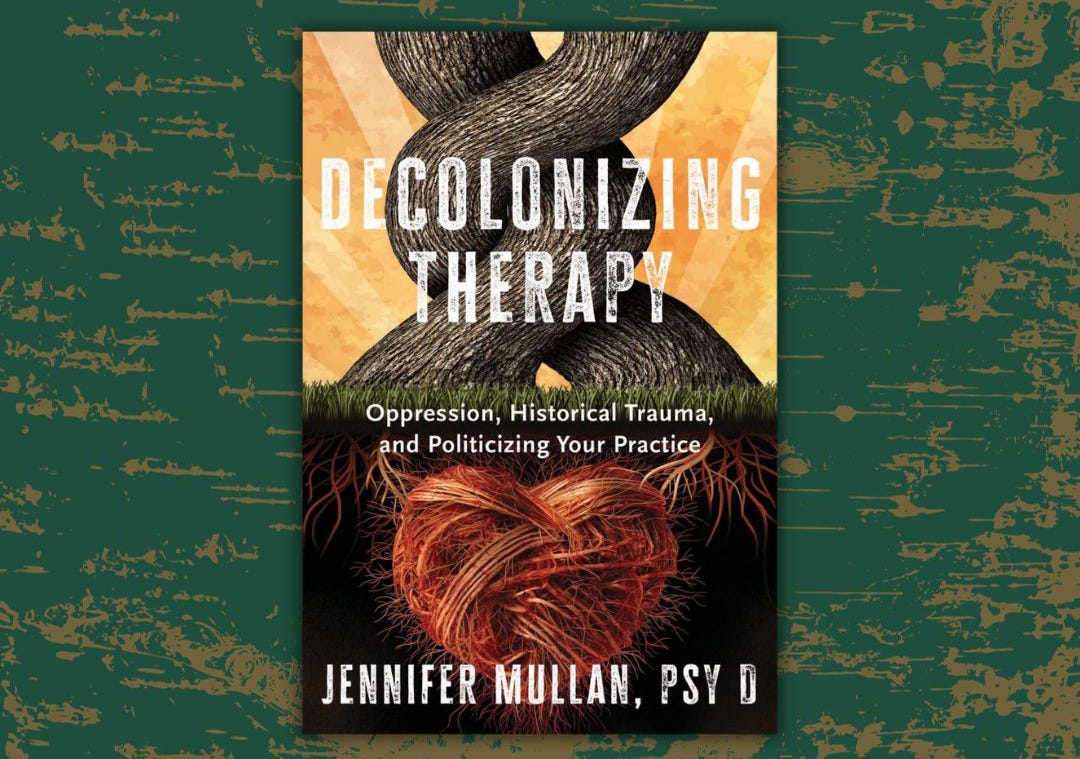
I get it! I think humor really makes the medicine goes down but there's also a subttle frontier when humor is used a way to go away from the deep emotions inside us and I think we should be aware of it. I think humor is an excellent tool but we need to know how and when to use it. I also feel uncomfortable when climate denials friends use the humor to avoid get into the matter. I know they are just using humor as a protective shell but it really makes me feel nervous. Maybe I need more humor too!
As someone who’s neurodivergent (high functioning autism), climate change has completely broken me as a human being. It honestly feels like I’m living in Hell, because people keep demanding I take action to single-handedly save the world, but my neurodivergence gets in the way. (Don’t want to go into the gory details, as I don’t want to divulge too much of my medical history here.)
It often feels like I’m a burden, a parasite, in more ways than one. I believe that’s why I find it so hard to cope, using humor or any other method. My brain literally just can’t comprehend how to cope at all, let alone coping with humor.
This has inspired me to write this comment because I want to suggest that maybe there’s work that can be done to help the neurodivergent people (like myself) not only cope, but fight back. There’s still a stigma surrounding autism (and other neurodivergent conditions) and climate change isn’t helping that at all. I know climate change affects everyone of all identities, but it feels like neurodivergent people have been forgotten in the chaos.